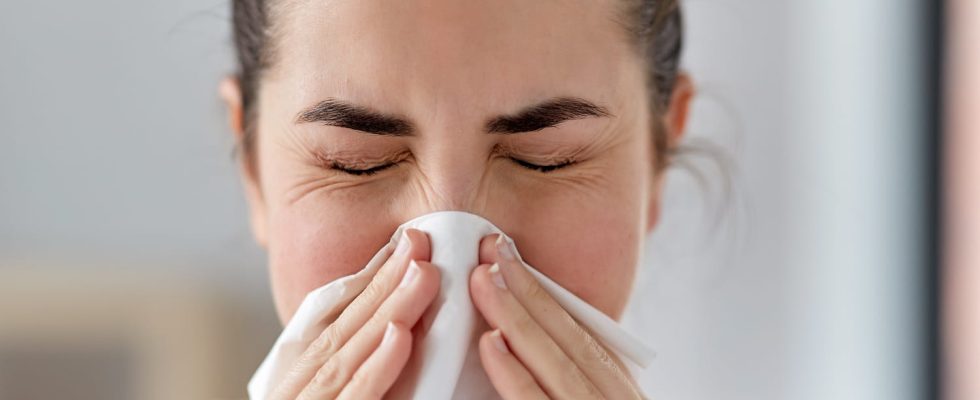Who says pollens, often says “allergic rhinitis”. This cold affects 25% of the French population. But how do you know if he is really allergic? Here are the 5 characteristic symptoms.
Runny nose, blocked… Do you have a cold? It may be allergic rhinitis, especially if you are sensitive to pollen. The point on this condition with Dr Catherine Quequet, allergist to know everything about allergic rhinitis (its symptomshow the cure…).
Definition: what is allergic rhinitis?
“Allergic rhinitis is a rhinitis which will appear in a unit of time and a unit of place, that is to say that we will have a triggering factor in the environment. “25% of the population is affected by allergic rhinitis“says the allergist. There are two types of allergic rhinitis:
- There persistent rhinitis that will last more than 4 weeks (chronic).
- There intermittent rhinitis which lasts less than 4 weeks.
What are the symptoms of allergic rhinitis?
“There is 5 main symptoms of allergic rhinitisunderlines Dr. Quequet:
- Itching in the nose : “patients regularly rub their noses from bottom to top”
- Rhinorrhea : “The nose flows either like a fountain through the nostrils or through the back of the throat”
- Sneeze bursts
- Stuffy nose
- Smell disorders (not always). “In these cases, we send the patient to the ENT in case there are other ENT pathologies such as polyposis in the nose”
In case of allergic rhinitis, look for food allergies
“These symptoms are sometimes associated with conjunctivitis and asthma” says Dr. Quequet, allergist. Moreover, “individuals with allergic rhinitis have the particularity of having the itchy bottom of the palate and they try to scratch it with their tongue“.
Does allergic rhinitis cause fatigue?
Allergic rhinitis tires the patient to the extent that he does not stop sneezing. “People describe great fatigueand there may be difficulty concentrating“says our expert.
What are the causes of allergic rhinitis?
The cause of allergic rhinitis is a hypersensitivity to certain allergens. We distinguish ;
- Allergens inside the house: mites, pets, mold.
- Outdoor allergens: pollen. “Knowing that these are anemophilous pollen (carried by the wind) which are allergenic” continues our specialist. When the weather is nice and there is wind, there are more pollens and more allergies. “Molds can also come from outside with those present in forests, hay rolls in the summer”.
- THE occupational allergic rhinitis: “hairdressers and hairdressers can suffer from persulphate rhinitis, bakers from baker’s asthma which will have started with allergic rhinitis, for example“.
► When there is an allergic rhinitis, always check for food allergies. “A birch pollen allergy can cause allergies to raw apple, raw pear, carrot, celery, peanut, hazelnut, chestnut, stone fruit, kiwi” develops the allergist. We speak of “crossed” allergy. “A cypress allergy can induce an allergy to peach, for example with a risk of anaphylactic shock”. Dust mite rhinitis can go hand in hand with allergies to snails, shrimp, squid, insects.
The symptoms are not the same. “A patient with asthma, during an acute attack, has hissing lungs on exhalation, coughs and feels short of breath“says Dr. Quequet.”During pollen rhinitis, we systematically look for asthma because some people have asthma without knowing it. 40% of people with allergic rhinitis have asthma. 80% of asthmatics have allergic rhinitis”.
What are the treatments for allergic rhinitis?
Allergic rhinitis is treated on three bases:
► Environmental management ; limit dust mites, animals (or wash them), vacuum cleaners with high efficiency filters for airborne particles (HEPA)
► The medical treatment : “antihistamines that are generally associated with intranasal corticosteroids”
► Desensitization: a specific sublingual immunotherapy, that is to say in the form of drops. “If it is the mites, we expect a desensitization every day for 3 to 5 years. Treatment can be started from the age of 5 years. Increase the drops and concentrations and then maintain a maintenance dose. For pollens, as it is a seasonal allergy, we will start desensitization a few months before the pollen season, we continue during the season and then we stop. We continue this rhythm 3 to 5 years” develops the specialist. For the pollens, it is interesting to follow the concentration outside through the application or by going to the site of the national aerobiological monitoring network (RNSA).
“To treat allergic rhinitis during pregnancy, you can also take certain authorized antihistamines prescribed by the doctor (list to be consulted on the CRAT)” indicates the allergist. Regarding desensitization, if it started before the start of pregnancy, it can be continued, but it cannot be started during pregnancy.. “Desensitization already in place is known to be tolerated by the patient so will not pose a problem for the baby“says Dr. Quequet.
Thank you to Dr Catherine Quequet, allergist and author of the book “Les nouvelles allergies”, editions of the Rock.
